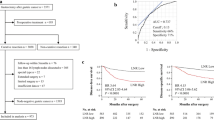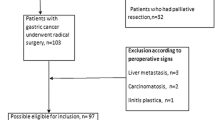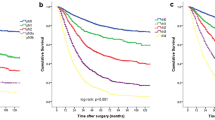Abstract
The purpose of this study was to clarify the outcome of the ratio between metastatic and examined lymph nodes (N ratio) in gastric cancer patients with ≤15 examined lymph nodes after D2 lymphadenectomy. A retrospective study was performed in 906 patients with gastric cancer who had undergone D2 resection. Patients with ≤15 examined lymph nodes (group 1, n = 729) and those with >15 lymph nodes (group 2, n = 177) were analyzed separately. N ratio categories were identified as follows: N ratio 0, 0%; N ratio 1, 1% to 9%; N ratio 2, 10% to 25%; N ratio 3, >25%. Univariate analysis found that both the tumor, node, metastasis system (N staging system) and N ratio system well classified patients with significantly different prognosis. By multivariate analysis, only the N ratio classification was retained as an independent prognostic factor in both group 1 and 2 compared with the N stage system. Furthermore, when patients were divided into four groups according to the number of lymph nodes examined (1 to 3, 4 to 7, 8 to 11, and 12 to 15), the 5-year survival rates remained similar between groups according to the same N ratio (p > .05). Positive N ratio classification is a better prognostic tool compared with N staging system after D2 resection in patients with gastric cancer. It can prevent stage migration and can be used regardless of the examined number of lymph nodes.

Similar content being viewed by others
References
Sobin LH, Wittenkind CH, International Union Against Cancer (UICC). TNM classification of malignant tumors. 5th ed. New York: Wiley, 1997.
Sobin LH, Wittenkind CH, International Union Against Cancer. TNM classification of malignant tumors. 6th ed. New York: John Wiley-Liss, 2002.
Kranenbarg EK, Hermans J, Krieken JHJMV, et al. Evaluation of the 5th edition of the TNM classification for gastric cancer: improved prognostic value. Br J Cancer. 2001;84:64–71.
Celen O, Yildirim E, Gulben K, et al. Prediction of survival in gastric carcinoma related to lymph node grading by the new American Joint Committee on Cancer/Union International Contre le Cancer System or the Japanese system. Eur J Surg Suppl. 2003;588:33–9.
Aurello P, D’Angelo F, Rossi S, et al. Classification of lymph node metastases from gastric cancer: comparison between N-site and N-number systems. Our experience and review of the literature. Am Surg. 2007;73:359–66.
Ichikawa D, Kurioka H, Ueshima Y, et al. Prognostic value of lymph node staging in gastric cancer. Hepatogastroenterology. 2003;50:301–4.
Coburn NG, Swallow CJ, Kiss A, et al. Significant regional variation in adequacy of lymph node assessment and survival in gastric cancer. Cancer. 2006;107:2143–51.
Feinstein AR, Sosin DM, Wells CK. The Will Rogers phenomenon: stage migration and new diagnostic techniques as a source of misleading statistics for survival in cancer. N Engl J Med. 1985;312:1604–8.
Nitti D, Marchet A, Olivieri M, et al. Ratio between metastatic and examined lymph nodes is an independent prognostic factor after D2 resection for gastric cancer: analysis of a large European monoinstitutional experience. Ann Surg Oncol. 2003;10:1077–85.
de Manzoni G, Verlato G, Roviello F, et al. The new TNM classification of lymph node metastasis minimises stage migration problems in gastric cancer patients. Br J Cancer. 2002;87:171–4.
Bunt AMG, Hermans J, Smit VTHBM, et al. Surgical/pathologic-stage migration confronts comparisons of gastric cancer survival rate between Japan and Western countries. J Clin Oncol. 1995;13:19–25.
Inoue K, Nakane Y, Iiyama H, et al. The superiority of ratio-based lymph node staging in gastric carcinoma. Ann Surg Oncol. 2002;9:27–34.
Kunisaki C, Shimada H, Nomura M, et al. Clinical impact of metastatic lymph node ratio in advanced gastric cancer. Anticancer Res. 2005;25:1369–76.
Estes NC, MacDonald JS, Touijer K, et al. Inadequate documentation and resection for gastric cancer in the United States: a preliminary report. Am Surg. 1998;64:680–5.
MacDonald JS, Smalley SR, Benedetti J, et al. Chemoradiotherapy after surgery compared with surgery alone for adenocarcinoma of the stomach or gastroesophageal junction. N Engl J Med. 2001;345:725–30.
Kooby DA, Suriawinata A, Klimstra DS, et al. Biologic predictors of survival in node-negative gastric cancer. Ann Surg. 2003;237:828–35.
Baxter NN, Tuttle TM. Inadequacy of lymph node staging in gastric cancer patients: a population-based study. Ann Surg Oncol. 2005;12:981–7.
Hundahl SA, Phillips JL, Menck HR. The National Cancer Data Base Report on poor survival of U.S. gastric carcinoma patients treated with gastrectomy: fifth edition American Joint Committee on Cancer staging, proximal disease, and the “different disease” hypothesis. Cancer. 2000;88:921–32.
Japanese Research Society for Gastric Cancer. The general rules for the gastric cancer study in surgery and pathology: part I. Jpn J Surg. 1981;11:127–39.
Yu W, Choi GS, Whang I, et al. Comparison of five systems for staging lymph node metastasis in gastric cancer. Br J Surg. 1997;84:1305–9.
Sandra L, Hong J, Brent K, et al. Hospital lymph node examination rates and survival after resection for colon cancer. JAMA. 2007;298:2149–54.
Zhang ZX, Gu XZ, Yin WB, et al. Randomized clinical trial on the combination of preoperative irradiation and surgery in the treatment of adenocarcinoma of gastric cardia (AGC)—report on 370 patients. Int J Radiat Oncol Biol Phys. 1998;42:929–34.
Karpeh MS, Leon L, Klimstra D, et al. Lymph node staging in gastric cancer: is location more important than Number? An analysis of 1,038 patients. Ann Surg. 2000;232:362–71.
Celen O, Yildirim E, Berberoglu U, et al. Prognostic impact of positive lymph node ratio in gastric carcinoma. J Surg Oncol. 2007;96:95–101.
Cheong JH, Hyung WJ, Shen JG, et al. The N ratio predicts recurrence and poor prognosis in patients with node-positive early gastric cancer. Ann Surg Oncol. 2006;13:377–85.
Marchet A, Mocellin S, Ambrosi A, et al. The prognostic value of N-ratio in patients with gastric cancer: validation in a large, multicenter series. Eur J Surg Oncol. 2008;34:159–65.
Kodera Y, Yamamura Y, Shimizu Y, et al. Lymph node status assessment for gastric carcinoma: is the number of metastatic lymph nodes really practical as a parameter for N categories in the TNM classification? J Surg Oncol. 1998;69:15–20.
Bando E, Yonemura Y, Taniguchi K, et al. Outcome of ratio of lymph node metastasis in gastric carcinoma. Ann Surg Oncol. 2002;9:775–84.
Saito H, Fukumoto Y, Osaki T, et al. Prognostic significance of the ratio between metastatic and dissected lymph nodes (n ratio) in patients with advanced gastric cancer. J Surg Oncol. 2008;97:132–5.
Therneau TM, Grambsh PM, Flemming TR. Martingale based residuals for survival models. Biometrika. 1990;77:147–60.
Marchet A, Mocellin S, Ambrosi A, et al. The ratio between metastatic and examined lymph nodes (n ratio) is an independent prognostic factor in gastric cancer regardless of the type of lymphadenentomy. Ann Surg. 2007;245:543–52.
Hartgrink HH, van de Velde CJ, Putter H, et al. Extended lymph node dissection for gastric cancer: who may benefit? Final results of the randomized Dutch gastric cancer group trial. J Clin Oncol. 2004;22:2069–77.
Cuschieri A, Weeden S, Fielding J, et al. Patient survival after D1 and D2 resections for gastric cancer: long-term results of the MRC randomized surgical trial. Surgical Co-operative Group. Br J Cancer. 1999;79:1522–30.
Ohtsu A, Yoshida S, Saijo N. Disparities in gastric cancer chemotherapy between the East and West. J Clin Oncol. 2006;24:2188–96.
Acknowledgment
Supported by National High Technology Research and Development (863) Program of China.
Author information
Authors and Affiliations
Corresponding authors
Additional information
Da-zhi Xu and Qi-rong Geng contributed equally to this work.
Rights and permissions
About this article
Cite this article
Xu, Dz., Geng, Qr., Long, Zj. et al. Positive Lymph Node Ratio Is an Independent Prognostic Factor in Gastric Cancer After D2 Resection Regardless of the Examined Number of Lymph Nodes. Ann Surg Oncol 16, 319–326 (2009). https://doi.org/10.1245/s10434-008-0240-4
Received:
Revised:
Accepted:
Published:
Issue Date:
DOI: https://doi.org/10.1245/s10434-008-0240-4




